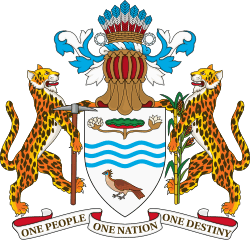1911 British Guiana general election
General elections were held in British Guiana in 1911.[1]
 |
|---|
| This article is part of a series on the politics and government of Guyana |
| Constitution |
|
Executive |
|
Legislature |
|
Administrative divisions |
|
|
|
Electoral system
The elections were held under the 1891 constitution, which provided for a 16-member Court of Policy, half of which was elected. The Court included the Governor, seven government officials (the Attorney General, the Government Secretary, the Immigration Agent General and the Receiver General, together with three other appointees). The eight elected members were elected from seven constituencies;[2] Demerara East, Demerara West, Essequebo North Western, Essequebo South Eastern, Berbice, City of Georgetown (2 members) and New Amsterdam.[3]
In addition, six "Financial Representatives" were also elected in six single member constituencies; Demerara, Essequebo North Western, Essequebo South Eastern, Berbice, Georgetown and New Amsterdam.[3] Together with the Court of Policy, the two groups formed the Combined Court.[2]
The franchise was restricted on the basis of a minimum income level, and women could not vote;[2] as a result, only 1.37% of the population were entitled to vote.[4] Although the minimum monthly income level had been reduced from £40 to £25 since the 1906 elections, only 251 of the 126,517 Indo-Guyanese population was on the voter roll, largely due to a lack of command of English.[1]
References
- Political changes (1891-1917) Guyana.org
- Historical information events and dates on the Parliament of Guyana from 1718 to 2006 Parliament of Guyana
- George D Bayley (1909) Handbook of British Guiana, 1909: Comprising General and Statistical Information Concerning the Colony, The Argosy, p158
- Silvius Elgerton Wilson (1997) The 1924 workers' incident at Riumveldt British Guiana and the development of Working People's Organisation University of Warwick, p183